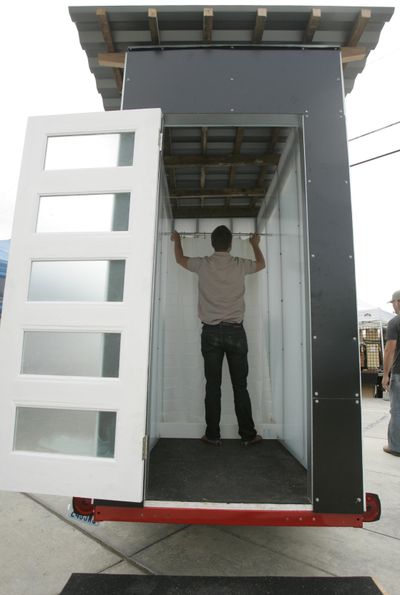Students design mobile shower
Aspiring architects at UW aim to help homeless

SEATTLE – For Doug McKeehan, 49, one of the hardest things about being homeless was trying to look like he wasn’t.
“It’s a full-time job just staying dry and clean and warm,” said McKeehan, who was homeless for several months five years ago and is now an activist with Seattle’s Real Change Organizing Project. “There are facilities out there, but they’re just overused and understaffed, and there’s just not enough of them.”
The lack of resources for King County’s estimated 8,500 homeless is why McKeehan has thrown his support behind Nickelsville, the renegade tent city that on Friday was forced from city land onto an adjacent state-owned parking lot.
But projects helping homeless people don’t have to be on a Nickelsville scale to make a difference, McKeehan said.
Efforts like the “traveling shower” designed and built by University of Washington architecture graduate students, on display at the Sustainable Ballard Festival Saturday, are a step in the right direction, he said.
“I don’t consider anything a drop in the bucket,” he said. “I actually find it refreshing and creative that groups are trying to find solutions like that.”
The project aims to serve people living out of their vehicles, which the Seattle/King County Coalition on Homelessness’ One Night Count estimated to be at least 650 in January. Some downtown shelters and drop-in centers provide showers, but lines are often long and conditions can be uninviting.
The prototype trailer, which houses a shower with hot and cold water, was a team effort between a group of UW architecture students and the Ballard Homes-for-All Coalition. The coalition hopes that churches will donate space in parking lots for the trailers and for a surrounding homeless car camp, said spokeswoman MaryLee Mahar.
The camps would consist of three or four vehicles, a portable toilet, the shower trailer and a series of planters to treat gray water, Mahar said. Churches would donate tap water through a hose and electricity to heat the water and light the shower.
“The idea was, let’s bring these people together in sanctioned spaces where they can be safer, and we can provide support,” said Adrienne Wicks, a 29-year-old UW student who helped design and build the trailer.
Attractiveness was a key factor in design, Wicks said, because the coalition was anticipating criticism from the trailer’s potential neighbors.
The trailer’s walls consist of two polycarbonate layers with fluorescent lighting in between. At night, it glows like a lantern, Wicks said, and because the lighting is between the walls, people outside can’t see in.
The designers, members of the socially conscious UW architecture student group TiLT, hope to run the trailer’s small water heater with solar panels. The prototype cost $2,000 to build, Mahar said.
The trailer attracted lots of stares and questions at the Ballard festival, and Mahar said she’s hopeful about one church that expressed interest.
“It would be great if the city was able to sponsor something like this, but it would be a long, uphill battle,” said Travis Anderson, a 31-year-old architecture student. “I just hope it will be a seed to effect some sort of change.”
For McKeehan, who is helping fight an uphill battle in Nickelsville, no seed is too small.
“Anything that will set up somebody that’s out and allow them to get a little bit clean and be able to survive on a daily basis is a wonderful thing,” he said.